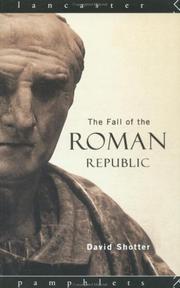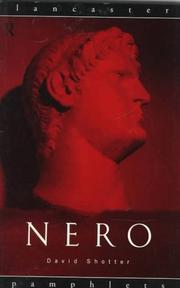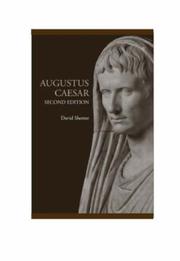| Listing 1 - 10 of 13 | << page >> |
Sort by
|

ISBN: 0415102928 9780415102926 Year: 1994 Volume: *13 Publisher: London : Routledge,
Abstract | Keywords | Export | Availability | Bookmark
 Loading...
Loading...Choose an application
- Reference Manager
- EndNote
- RefWorks (Direct export to RefWorks)
Rome --- History --- Politics and government --- Histoire --- Politique et gouvernement --- Histoire romaine --- --Ier s. av JC, --- -Rome --- -Histoire romaine --- Republic, 265-30 B.C. --- Ier s. av JC, 100-1 av JC --- Rome - History - Republic, 265-30 B.C.

ISBN: 9780415129312 0415129311 Year: 1997 Publisher: London ; New York : Routledge,
Abstract | Keywords | Export | Availability | Bookmark

ISBN: 9780415319409 0415319404 Year: 2006 Publisher: London ; New York : Routledge,
Abstract | Keywords | Export | Availability | Bookmark
 Loading...
Loading...Choose an application
- Reference Manager
- EndNote
- RefWorks (Direct export to RefWorks)
Rome --- History --- Republic, 265-30 B.C.

ISBN: 1280099410 020302298X 9780203022986 9780415319416 0415319412 0415319412 0415319420 9780415319423 9781134364329 1134364326 9781134364275 113436427X 9781134364312 1134364318 9781280099410 Year: 2005 Publisher: London New York Routledge
Abstract | Keywords | Export | Availability | Bookmark
 Loading...
Loading...Choose an application
- Reference Manager
- EndNote
- RefWorks (Direct export to RefWorks)
The reign of Nero is often judged to be the embodiment of the extravagance and corruption that have, for many, come to symbolise ancient Rome. In Nero David Shotter provides a reassessment of this view.

ISBN: 0203022882 1134364539 1280168749 9780203022887 9780415319355 0415319358 9780415319362 0415319366 9786610168743 6610168741 0415319358 0415319366 9781134364534 9781134364480 1134364482 9781134364527 1134364520 1566196671 9781566196673 9781280168741 Year: 2005 Publisher: London New York Routledge
Abstract | Keywords | Export | Availability | Bookmark
 Loading...
Loading...Choose an application
- Reference Manager
- EndNote
- RefWorks (Direct export to RefWorks)
History sees Augustus Caesar as the first emperor of Rome, whose system of ordered government provided a firm and stable basis for the successive expansion and prosperity of the Roman Empire over the next two centuries. Hailed as restorer of the Republic' and regarded by some as a deity in his own lifetime, Augustus became an object of emulation for many of his successors. This pamphlet reviews the evidence in order to place Augustus firmly in the context of his own times. It explores the background to his spectacular rise to power, his political and imperial reforms, and the creation of the Respublica of Augustus and the legacy left to his successors. By examining the hopes and expectations of his contemporaries and his own personal qualities of statesmanship and unscrupulous ambition, Shotter reveals that the reasons for Augustus' success lie partly in the complexity of the man himself, and partly in the unique nature of the times in which he lived.
Emperors --- Augustus, --- Octavius Caesar, --- Gaius Octavius, --- Octavius, Gaius, --- Octavianus, --- Octavianus, Gaius Julius Caesar, --- Gaius Julius Caesar Octavianus, --- Octavian, --- Caius Julius Caesar Octavianus, --- T︠S︡ezarʹ Oktavian Avgust, --- Oktavian-Avgust, T︠S︡ezarʹ, --- Avgust, T︠S︡ezarʹ Oktavian, --- Octavianus Augustus, --- Augusto, --- Cesarz August, --- Ogusṭus, --- Augustus Caesar, --- Gaius Octavius Thurinus, --- Octavio Augusto, --- Cayo Octavio Turino, --- Thurinus, Gaius Octavius, --- Turino, Cayo Octavio, --- אוגוסטוס --- Rome --- History

ISBN: 1134364172 0203354524 1134364180 1280046791 0203625021 9780203625026 0203344758 9780203344750 9780415319454 0415319455 9780415319461 0415319463 9780415076548 9780203976340 Year: 2004 Publisher: London New York Routledge
Abstract | Keywords | Export | Availability | Bookmark
 Loading...
Loading...Choose an application
- Reference Manager
- EndNote
- RefWorks (Direct export to RefWorks)
A concise and accessible survey of the character and life of Tiberius Caesar, heir of Augustus Caesar and emperor of Rome from AD 14 to AD 37.

ISBN: 0203354370 1280055227 0203622928 9780203622926 9781134364206 9781134364244 9781134364251 9780415319430 9780415319447 1134364245 0415319447 0415319439 Year: 2004 Publisher: New York Routledge
Abstract | Keywords | Export | Availability | Bookmark
 Loading...
Loading...Choose an application
- Reference Manager
- EndNote
- RefWorks (Direct export to RefWorks)
Britain was part of the Roman Empire for around 400 years and this book offers a concise introduction to this period.
Romans --- Great Britain --- History

ISBN: 1134364385 1134364393 1280244488 9786610244485 0203622855 9780203622858 9780203977262 0203977262 9780415319393 0415319390 9780415319409 0415319404 0415319390 0415319404 9780415102926 0415102928 9781134364343 9781134364381 9781134364398 Year: 2005 Publisher: London New York Routledge
Abstract | Keywords | Export | Availability | Bookmark
 Loading...
Loading...Choose an application
- Reference Manager
- EndNote
- RefWorks (Direct export to RefWorks)
Revised and updated to include the latest research in the field, this second edition of a popular history text examines how the Roman republic was destabilized by the unplanned growth of the Roman Empire.Central discussion points include:the government of the republichow certain individuals took advantage of the expansion of the empireJulius Caesar's accession to powerthe rise of the Augustan principate following Julius Caesar's murder.Drawing on a wealth of recent scholarship and including an expanded and updated guide to further

ISBN: 1138167452 1315839954 1317881427 9781317881421 9781317881414 1317881419 9781315839950 9780582328167 0582328160 9781317881407 1317881400 9781138167452 Year: 2014 Publisher: London Routledge
Abstract | Keywords | Export | Availability | Bookmark
 Loading...
Loading...Choose an application
- Reference Manager
- EndNote
- RefWorks (Direct export to RefWorks)
The name of Rome excites a picture of power and organisation, as do the widely-spread ruins that Roman civilization left behind. Yet Rome grew out of a collection of small villages and major developments such as the growth of Empire were unplanned and completely unprepared for.Influenced by a small number of self-interested aristocrats who lacked a broader vision, Rome was often threatened by their intrigues. Brought to the ground on a number of occasions, its leaders were able to snatch victory from the jaws of defeat. How did Rome survive for nearly 1000 years, ruling over millions of people
Book
ISBN: 9781405824576 1405824573 Year: 2008 Publisher: Harlow, England : Pearson Longman,
Abstract | Keywords | Export | Availability | Bookmark
| Listing 1 - 10 of 13 | << page >> |
Sort by
|

 Search
Search Feedback
Feedback About UniCat
About UniCat  Help
Help News
News